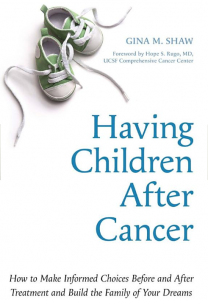 When Gina Shaw was undergoing cancer treatment, she tried to find a book that could clearly and simply provide her with information about having children after cancer. Shaw, who started chemotherapy on her 37th birthday and did not have any children at the time, could not find any such resource. As a freelance writer, Shaw decided to write her own book to discuss the family-building options that cancer patients have before, during, and after completing treatment. She talked with the Oncofertility Consortium about the making of her book, which was published last week.
When Gina Shaw was undergoing cancer treatment, she tried to find a book that could clearly and simply provide her with information about having children after cancer. Shaw, who started chemotherapy on her 37th birthday and did not have any children at the time, could not find any such resource. As a freelance writer, Shaw decided to write her own book to discuss the family-building options that cancer patients have before, during, and after completing treatment. She talked with the Oncofertility Consortium about the making of her book, which was published last week.
The book, Having Children After Cancer: How to Make Informed Choices Before and After Treatment and Build the Family of Your Dreams, discusses many of the fertility issues involved in cancer treatment. In it, Shaw talks about how different treatments can affect the fertility of men, women, and children in addition to laying out the different methods for fertility preservation. The book also provides information to cancer survivors who are interested in learning about options if their fertility has been compromised by cancer or its treatment. Finally, as any other expectant parents, cancer survivors often wonder how the physical and genetic aspects of their cancer can affect their children. In her book Shaw answers these questions and discusses the emotional issues of parenthood after cancer.
Gina Shaw guides cancer patients and survivors through the book by providing the personal stories of about two-dozen survivors. Shaw stated that she, “interviewed patients about what it felt like to undergo embryo banking, chemotherapy, and more.” She also talked with women who had received radiation for breast cancer and described their experiences breast-feeding, as radiation can impair later lactation on that breast.
In addition to talking with patients, Shaw also interviewed medical experts in the reproductive, oncology, and oncofertility fields. She said, “The members of the Oncofertility Consortium were really helpful and played a key role in the fertility preservation, financing, and insurance sections of the book.”
In discussing fertility preservation, Shaw stated that about half of the survivors she met with were not informed of their fertility preservation options and that, “Some people who were informed received that information in a very cursory way.” In addition, she described that survivors who received cancer treatment, “ in a small community-based oncology setting may be less likely to receive fertility information,” than those in large centers. With the publication of Shaw’s new book and the continued work of the Oncofertility Consortium, hopefully all young cancer patients will receive fertility information at the time of cancer diagnosis.

